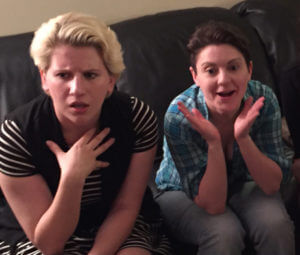 Wargs, Wildings, White Walkers, the Wall, the Red Wedding.
Wargs, Wildings, White Walkers, the Wall, the Red Wedding.
Even casual fans of “Game of Thrones” will instantly recognize the lingo. But for those interested in delving deeper into HBO’s hit series, NIU graduate students this past semester created an impressive wiki website dubbed “Scholars of the Throne.”
Thirteen students developed the site—described as a “scholastic source for all things ‘Game of Thrones’ ”—for communication professor Jeff Chown’s seminar titled, “Blogging Television.” While the semester has ended, Season 6 of “Game of Thrones” has arrived—and the Scholars of the Throne site lives on (much like a certain character in the series).
“Our intention was to create a product that would exist beyond the 15-week course,” said Chown, a Board of Trustees professor emeritus of media studies. “We want this to be a premiere site for people who want to do scholarly writing on George R.R. Martin’s work. We don’t want to compete with the fan sites, but rather be a springboard toward serious thought and writing about the controversial show.”
To prepare for Season 6 of “Game of Thrones,” the graduate students wrote weekly blogs on the first 50 episodes of the series—about three to four episodes a week. They read their fellow students’ blogs and supplied comments in a workshop environment. A number of students have pledged to continue blogging on new episodes this summer as well.

Lauren Fowkes (left) and Katie Hemmeter during a recent “Game of Thrones” watch party at professor Jeff Chown’s house.
The wiki website also serves as a repository of their scholarly research. Students read and annotated 120 scholarly articles on the series for the site’s bibliography pages, where research summaries are organized by topic, including the show’s portrayals of violence, race, politics and gender and sexuality.
Students also compiled a Pantheon section, which selected the top 25 professional bloggers on “Game of Thrones,” again with annotations and links. Other website sections they developed provide links to professional fan sites, descriptions of Thrones-related college courses across the country and useful critiques of entertainment-news coverage at 19 mainstream media publications.
“There was a lot more to this seminar than just watching a television series,” said graduate student Max Seisser, who spearheaded social media aspects of the website.
 “Through our class discussion, we’ve analyzed different aspects of media production, politics, economics, sexual violence, historical references and many more societal issues,” Seisser said. “This seminar has allowed me to enjoy writing and to be more creative throughout the process.”
“Through our class discussion, we’ve analyzed different aspects of media production, politics, economics, sexual violence, historical references and many more societal issues,” Seisser said. “This seminar has allowed me to enjoy writing and to be more creative throughout the process.”
For Chown, this wasn’t his first go-around teaching a course on the HBO series.
In the spring of 2015, he and history professor Valerie Garver launched their first honors seminar on “Game of Thrones,” seizing upon the show’s immense popularity to create engaged-learning opportunities for students.
The pair of professors received international attention when an Associated Press wire story about the class was picked up by over 600 media outlets. A deluge of requests for interviews came in from France, Canada, Asia and many major American news outlets. The professors were chagrined to find their words translated in Dutch, Chinese, French and Indonesian.
While Garver taught the “Game of Thrones” honors seminar for undergraduates this spring, Chown decided to try a different approach with the graduate students, focusing the seminar on the act of writing for the internet about entertainment, hence “Blogging Television.”
The work is already starting to pay off for his students.
Nathan Blake, who earned his master’s degree this month, reports that the “Game of Thrones” blog in his portfolio helped him land a job. Aimee Burns, who also graduated with her master’s degree, was the first in the class to develop followers from other blogger networks working on “Game of Thrones.” Shawn Hannan was excited to tell the class he had someone from India following his blog.
Katie Hemmeter and English doctoral student Marilyn Lorch headed up the creation and maintenance of an accompanying Facebook site. “This has been a really unique course experience,” Hemmeter said. “The most fascinating part has been reading what my classmates have written. It spurs some really great conversations.”
Hemmeter and Lorch will be among the students continuing their blogs into the summer.
After all, somebody has to chronicle a certain character coming back to life.


